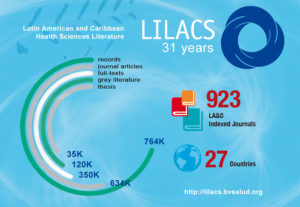LILACS – Latin American and Caribbean Literature in Health Sciences is the index of the health scientific and technical literature in Latin America and the Caribbean (LA&C) regionally coordinated by the Latin American and Caribbean Center on Health Sciences Information (BIREME), which for 31 years has contributed to increasing the visibility, access and quality of information in the Region. LILACS is freely available to access through the Virtual Health Library (VHL) and its own portal.
The LILACS index is a public good collectively built by a Collaborating Network comprising 900 cooperating centers and libraries that index articles from 923 journals,  books and monographic materials, theses and non-conventional documents (gray literature) published in the LA&C countries, with a strong emphasis inPublic Health.
books and monographic materials, theses and non-conventional documents (gray literature) published in the LA&C countries, with a strong emphasis inPublic Health.
One of BIREME’s commitments fulfilled through LILACS as a Regional Health Information Center is to perform the bibliographic control and promote the dissemination and quality of the scientific and technical literature produced and published in LA&C countries, especially literature indexed in international indexes, such as MEDLINE.
MEDLINE indexes about 6,000 scientific journals from 70 countries, of which only 92 are from 12 LA&C countries. Of the total number of articles in MEDLINE (over 26 million), LA&C journals do not reach 2% of the total content.
In fact, it is possible to state that LILACS complements MEDLINE, not only with journals articles not indexed in this database, but also with other publications such as non-conventional documents and graduate theses.
Another relevant aspect to be considered in LILACS publications is the applicability of the research results in the LA&C context, taking into account that most of them result from epidemiological studies conducted in the Region.
LILACS may contribute to the evaluation of the scientific output in LA&C
In countries such as Brazil, Argentina, Peru and Colombia, LILACS is a criterion considered in the evaluation and qualification mechanisms of the scholarly communication, as well as using data from LILACS in infometrics analysis and systematic reviews.
For LILACS to be a reliable source and an important resource for the evaluation of LA&C scientific output, BIREME has been strongly working on the following axes:
- Standardization and qualification of bibliographic records, especially in the names of authors and affiliation data (country and institution of affiliation);
- Expansion of the number of non-conventional literature and graduate theses, especially in Public Health;
- Creation of a Network of Evaluators of journals and other types of documents submitted to LILACS; and
- Implementation of a system for categorizing LILACS documents by level of evidence and application area (e.g. health systems, clinical care, research and education).
LILACS in numbers
According to data from January 2017, LILACS brings together more than 764,000 bibliographic references of documents published in LA&C countries since 1982. The majority of them (81%) are articles from 923 journals from 19 countries, but there are also other types, such as unconventional documents (gray literature), theses, congress papers and non-serial publications (books).
Some countries concentrate a greater scientific production in LILACS, such as Brazil, with 358 indexed journals, Argentina with 137 journals, Colombia with 107, Chile with 64 and Mexico with 48 journals.
Approximately 90% of the documents indexed in LILACS in the last five years include a link to the full text, guaranteeing the user access to complete information beyond bibliographic citation data. Among the 339 SciELO health journals of LA&C, 317 are also indexed in LILACS and the metadata of the articles published in new issues of these journals are regularly transferred to LILACS with a link to the full texts.
LILACS relies in a collaboration network of more than 900 collaborating centers in libraries that fulfill the role of document selection, bibliographic description and content indexing. Also, more than 300 journal editors contribute to the regular submission of metadata of articles from their journals in LILACS. BIREME is responsible for the coordination, training and technical and methodological support for this LILACS Collaboration Network.
LILACS uses the controlled vocabulary DeCS – Descriptors in Health Sciences, for indexing and retrieving documents, and the LILACS Methodology for the bibliographic description. The network’s contribution to the database itself is managed through LILDBI-Web, LILACS Submission, and more recently by FI-Admin. It is a methodological and technological package that, besides managing all the operation and updating processes of the database, allows LILACS to function as a full text repository, thus guaranteeing the preservation and easy access to documents registered in the database